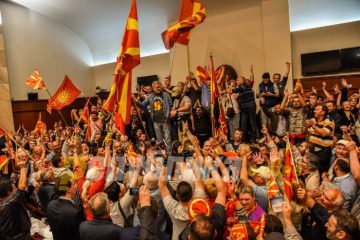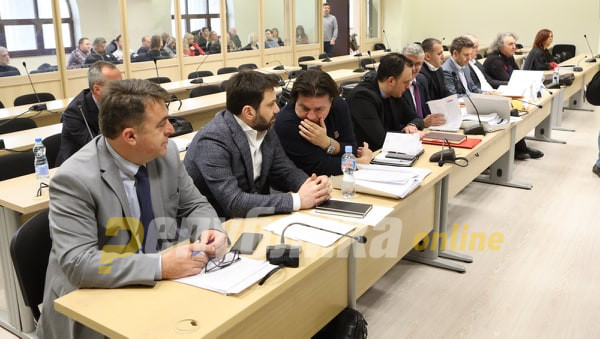During the closing arguments of the second April 27th trial, both the prosecution and the defense resorted to evoking historic figures and portrayed the process in its broader place in Macedonian history. The case pits the Zaev regime against several former VMRO-DPMNE officials, who are accused of allegedly organizing the 2017 protests that ended with an incident in the Parliament when SDSM provoked an irregular vote for a new Speaker.
Prosecutor Vilma Ruskoska, who also led the first trial in this case – a trial that was used to blackmail VMRO members of Parliament into voting for the imposed name change – started the historic analogies by quoting Goce Delcev. “History knows not of a different example where a nation with the same tradition, language and religion is divided in so many factions. One more alien than the other”, she quoted the legendary VMRO leader.
Defense attorney Donco Nakov responded by reminding Ruskoska that the Zaev regime, who she faithfully serves, is negotiating giving Goce Delcev away to Bulgaria. “He is not ours any more”, Nakov told Ruskoska. He then placed the trial in the long list of politically driven, court-marshall trials from the Communist era, especially the prosecution of Macedonia’s first post-war President Metodija Andonov – Cento in 1946. Cento’s great-grandson Jane Cento was sentenced to 15 years in prison in the first April 27th trial, in what was clearly a political message from the Zaev regime to VMRO supporters.
Cento was sentenced to 11 years in prison, allegedly because he wanted to flee Yugoslavia for Greece, and from there demand the creation of an independent Macedonia at the Paris conference. But today Cento is the only person who is honored by representatives of all political parties, Nakov said, warning Ruskoska how her actions will be remembered in history. He named the prosecutors who condemned the elder Cento, and whose memory remains reviled.

Pressing reports that the methods of the prosecution in this trial greatly resemble those of the Communist regime, and left a clear impression that the former VMRO-DPMNE officials Trajko Veljanoski, Mile Janakieski, Spiro Ristovski and police official Vladimir Atanasovski are victims of a political trial. The site followed the trial in detail, and showed how the prosecution built its case on one unreliable witness, who cut a deal with the prosecution early on and was called on to support all claims by the prosecutors in both the original and the second April 27th trial. This, even after forensics evidence showed that the witness was not in the VMRO-DPMNE office on the day of the incident in the Parliament and could not testify about conversations that allegedly took place there.
The trial is also burdened by the fact that the Zaev regime gave selective amnesties to defendants in the original trial, when Zaev needed their votes in the Parliament. But now, it uses the second, expanded trial, to continue to exert pressure on the VMRO-DPMNE party, and to try to wring out more political points from the incident. Sentencing is due in two weeks. Pressing found the court, unlike the prosecution, to act professionally and reports that it offers some hope to the defendants. But given the track record of the judiciary under Zaev, they shouldn’t hold too much hope. More broadly, how the trial will be remembered depens more on the outcome of the political experiment that Zaev initiated after he grabbed power, using the April 27th incident. Macedonia is now a nation in flux, facing demands from all sides in the neighborhood, with its identity and its historic narrative rapidly disintegrating. If Zaev’s policies succeed in eventually delivering prosperity and recognition on the European map, as he promised, he and Ruskoska may be remembered in a positive light. But they may just as easily break the Macedonian state.





Comments are closed for this post.